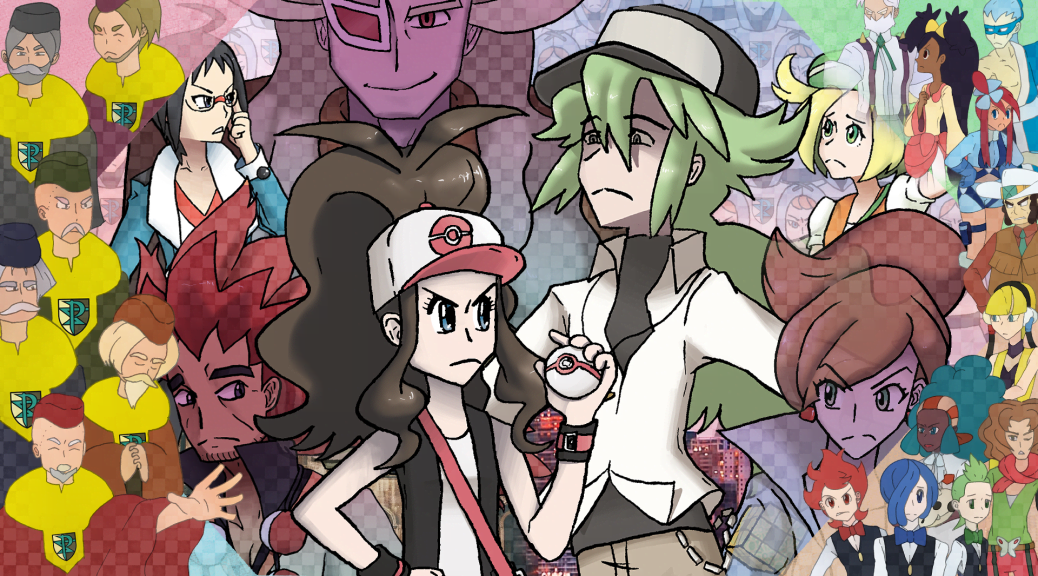Part III: The Cast of Unova
Part III of our tribute to Pokémon Black and White focuses on each of the games’ many characters.
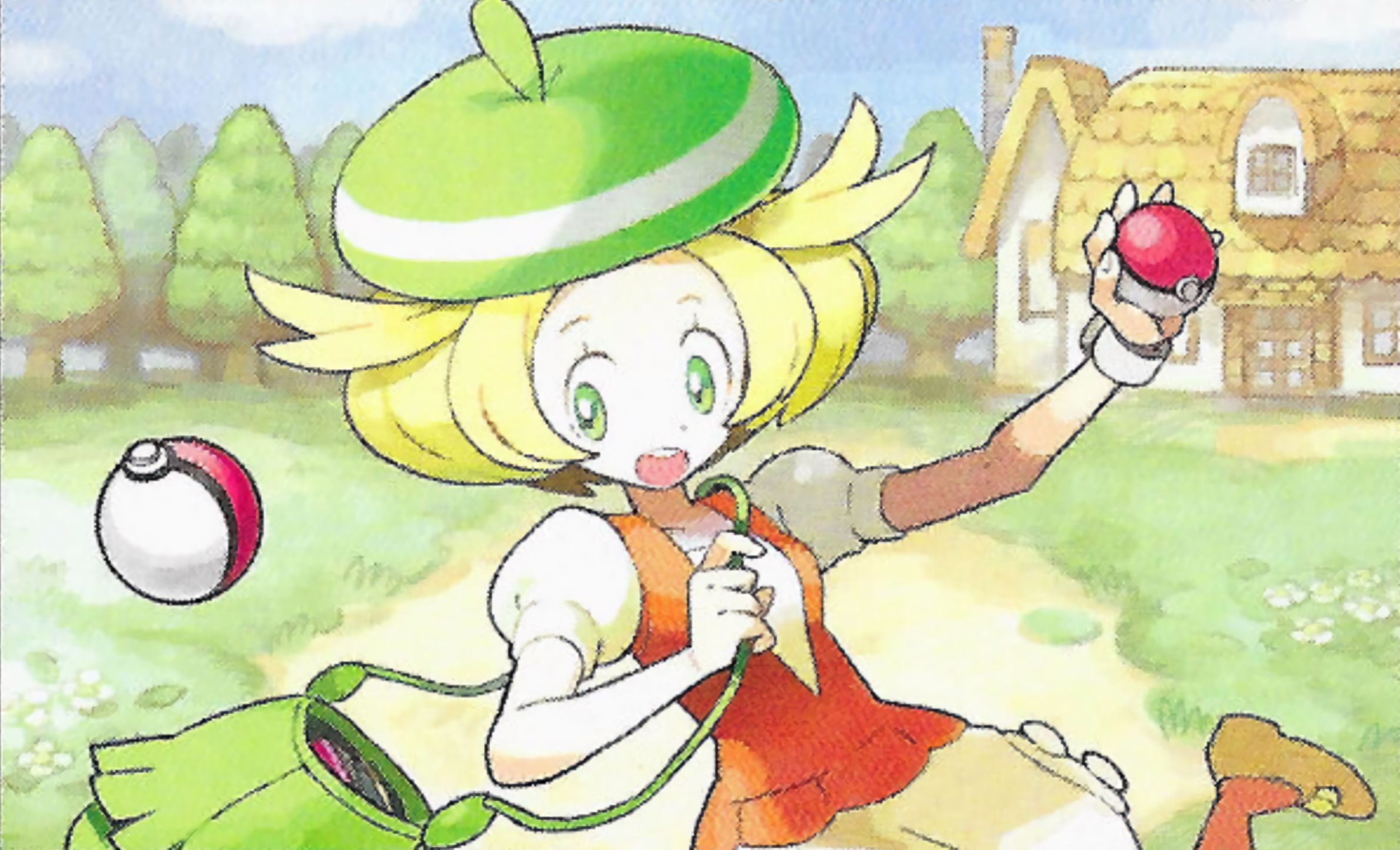
Part III: The Cast of Unova
Hilda and Hilbert | Juniper | Bianca | Cheren | The Gym Leaders | The Elite Four | Alder
Team Plasma Grunts | Concordia and Anthea | The Seven Sages | The Shadow Triad | Ghetsis | N
Bianca
Like what her namesake represents—bianca, Italian for “white,” or Bel in Japanese, from the Ukrainian word for “white”—Bianca is both innocent and fearful,1 observational and considerate of others. Despite her joviality and supportiveness, she’s also nervous, struggling to stand up for herself when faced with adversity.
Before even meeting Professor Juniper face-to-face, the player walks in on a frightful scene in Bianca’s home. Bianca’s father yells that she may not go on a journey with Pokémon. She pleads on her father’s deaf ears that she’s “a good Trainer who got a Pokémon” and “can totally go on an adventure!”
Bianca is thankfully able to make an escape, but it doesn’t resolve the underlying issue. Described by her own father as “know[ing] nothing about the world,” Bianca shortly after seeks justifications for beginning her Pokémon adventure, mumbling to herself that “since the professor asked us, it’s OK to go on an adventure, right? I can explore and maybe find out what I want to do in life. I think I’d like that.” Although she’s as unsure about herself as she is about the world around her, Bianca recognizes that in order to discover her “calling,” she needs life experience.
 Bianca focuses on fun and lighthearted activities early on, such as simply catching Pokémon and taking leaps into new routes together with her friends. She’s also more closely involved with Juniper’s early tutorials. This clever inclusion both continues to establish her inexperience with Pokémon while also setting her up on a path that she may want to take in the future involving the professor.
Bianca focuses on fun and lighthearted activities early on, such as simply catching Pokémon and taking leaps into new routes together with her friends. She’s also more closely involved with Juniper’s early tutorials. This clever inclusion both continues to establish her inexperience with Pokémon while also setting her up on a path that she may want to take in the future involving the professor.
Even as the game progresses, she interacts with the professors a lot in general. She has an extra Dowsing Machine to give you in Nacrene precisely because she spoke further with Fennel in Striaton. And Bianca remains at Professor Juniper’s side all throughout their excursion in Chargestone Cave. This establishes much-needed consistency to allow her relatively low-stakes growth to feel natural and fulfilling.
Other small details, such as her obtaining a Munna after staying behind to try and find one at the Dreamyard, or her being late to meet you at the gate to Route 4 even after being the one to invite you there, continue to compile consistency while solidifying Bianca’s role as a hard-working, albeit non-threatening, character. Similarly, while her team naturally progresses from battle to battle, the moves she selects aren’t as tactical compared to Cheren’s, and she never utilizes held items, either. She grows as a character, but at an appropriate pace and in a way that keeps her relevance at a consistent level. Players won’t find themselves suddenly feeling more challenged battling Bianca compared to Cheren, even as she improves both herself and her team. They also won’t find Bianca is suddenly crucial to resolving a high-stakes conflict.
In fact, Bianca is the indirect cause of some of the games’ minor conflicts. In Castelia City, Bianca is the victim of theft at the hands of Team Plasma. What’s worse, her Pokémon was apparently so easy to steal that a grunt returns to try and snatch another. As awful as it is, it confirms the important point that Bianca lacks the strength to protect her own Pokémon. She is in no way describable as a “strong Trainer.” But if that’s the case, what is Bianca?
What can Bianca even be?
After players receive their Insect Badge, they receive a call from Bianca. She’s certain she can now protect her own Pokémon after some training with her “bodyguard,” Iris, and would like to have a battle to see just how much she’s grown. In the gate leading to Route 4, she catches up to you and—having not forgotten the dangers of indoor battling from her earlier experience battling in your room—checks with the clerk to make sure it’s okay.
“My Pokémon and me!” she proclaims, “We trained and got tough!” She never suggests the weakness of her Pokémon is the reason for her shortcomings, but instead “trains” herself alongside them so she can better care for them. Team Plasma’s theft of her Munna lays the groundwork for Team Plasma’s goals as well as spurs Bianca’s growth, giving her even more reason to become stronger and to protect her Pokémon. And she has become stronger: her team’s levels are strengthened, and she uses items in battle as well, showing a natural progression from her prior fight.
But it still isn’t enough—and it will never be enough. You, the player, must always win in the end, and especially against Bianca, the weakest of your rivals. “I trained with Iris… But I still couldn’t win…” she sighs after the loss. She turns away from you and continues, “I’ll never be a strong Trainer like you or Cheren or Iris, but… You know, since we left Nuvema Town, I’ve met a lot of people and I’ve been thinking about what I want to do in life! When you look at it that way, Pokémon have given me a lot of new experiences.” Just as in reality, things won’t always go smoothly, and people won’t always succeed, but it’s those very experiences that help people grow.
She musters up the courage to turn back to face you before continuing: “Having my Pokémon stolen was just really hard, and I felt really unsure… Still, I gotta say I’m really glad I went! I’ve learned so much on this journey.” She bids you good-bye and returns to Castelia, still needing to tackle the Gym challenge herself, while you, already owning the Insect Badge, may move forward to the sandy expanses of Route 4.
It almost seems as if Bianca knows she can’t defeat you, especially at this point. But while her disappointment is understandable, as loss is always disappointing, she uses her battles against the player to judge how much she’s grown. She’s not competing against the player, trying to keep a high win streak, but is instead competing against herself, trying to grow stronger individually as she discovers her way in life.
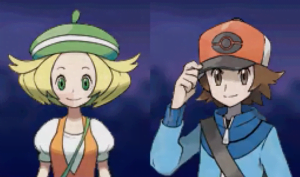
All of Bianca’s losses—to the player, of her Pokémon to Team Plasma—and all of her gains—her new human and Pokémon friends, and the strength she gained from them—culminate in Nimbasa City. Bianca’s sightseeing is cut short as she finds her father waiting for her just outside the Musical Theater.
Bianca’s father demands to take her back home; the distance she’s traveled is “far enough.” Bianca backs away, frightened—she wants to keep traveling together with her Pokémon and the player. “Absolutely not!” Bianca’s father proclaims. “Others do things their way, and we do things ours!” Just because other people go on adventures with Pokémon doesn’t mean Bianca’s father has to let her do so, too.
“Is that so?” Bianca asks. Finally, she musters up the courage she once lacked: “Then, how about you do things your way, and I’ll do things mine!” The young lady who could not stand up to Team Plasma now stands before her disapproving father and holds her ground. She does not run in fear as she did back in Nuvema Town, and she puts up a fight unlike when she was robbed in Castelia City.
The local Gym Leader, Elesa, steps in to side with Bianca, explaining to her father that journeys are a necessary component of learning about what makes you different from others—what makes you unique. And while those differences will lead to conflict and pain, they are, ultimately, necessary. But this is exactly what Bianca’s father fears—although he comes across as aggressive and far too controlling, he, deep down, simply wants his daughter to remain safe from the dangers of the world.
Bianca adds to Elesa’s point: “There’s gonna be painful stuff like you’re worrying about! Really, I get it…” She refers, surely, to her stolen Munna. But there have been good people, too: for every Team Plasma encounter, there have been Gym Leader allies ready to help both her and you. And Bianca is certain that ever since starting her journey, she has grown stronger—and you know it’s true. Bianca, even at her weakest, has been taking action to push herself forward through trials and tribulations. She may never be a strong Trainer, and she may still not know what goals she would like to pursue in life, but she has no doubt grown stronger as a person—and it’s all thanks to her experiences, the conflicts she has had to overcome, during her journey. There cannot be yin without yang—there is no joy without sorrow. Conflict is a necessary component of growth.
Finally, Bianca’s father concedes, and gives Bianca his blessing to continue on her adventures. He goes on his way, and Bianca calls out to him—a promise that she’ll return home once she discovers what she truly wants to do in her life. As Bianca once again resolves herself to discover what it is she wants to achieve, she can’t help but feel admiration towards Elesa, who was so easily able to help protect someone in need.
“I want to be a totally cool woman like Elesa! Mm. I wonder how I’ll get there.” Although Bianca’s character arc has reached its climax, her story is not yet over. She will continue to challenge the Gyms and will continue to challenge you on occasion, but her role is not tied to the Gym Challenge like yours and Cheren’s. Starting from now, she will be questioning herself and the world around her in an attempt to continue to grow.
And if you choose to go back to Nuvema Town after this run-in with Bianca’s father, you’ll find his tone has changed entirely. “Well, then. I look forward to the stories Bianca will have for us next time she comes home.” You later find he gives her the HM for Fly so she may return home whenever she likes, far more in-line with a protective but still encouraging parent. She never gets a Pokémon that can use it, but that’s fine for now—she’ll keep journeying until she discovers her calling in life, and the fact that her father supports her is gift enough.
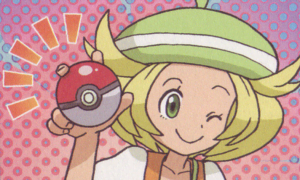
Bianca’s growth can be attributed to encounters, not just with Pokémon, but with people. This offers her a particularly relatable character arc as it applies to anyone playing.
In Chargestone Cave, Bianca is actively wondering why Pokémon “stay by our sides,” and looks forward to catching more, emphasizing the encounters one comes across while traveling.
She also says, “I’m the professor’s bodyguard! Well, that’s probably not necessary, but you have to protect important things!” Just as one protects their precious Pokémon, Bianca is learning to protect not just her team, but the people around her as well. She continues this at Dragonspiral Tower, where she tells Cedric that “[the player] and Cheren are both really, really strong, and they’ve beaten Team Plasma before. But…I’m not all that strong, actually. I admit it. I’m not very strong, so I was thinking… It would be nice if, maybe, I could… Stay here and be your bodyguard?”
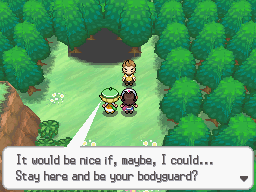 This also emphasizes the importance of encounters specifically through the use of role models. While Juniper and the other professor characters, Cedric and Fennel, are clearly a strong and powerful influence on Bianca, she learned about being a “bodyguard” from Iris in Castelia City. She likely never considered a bodyguard was something she could be before that point. Bianca reacts just as anyone else would, learning about potential career choices through what she sees from her role models. And just as Juniper, the most notable of professors, is a woman for Bianca to better relate to, it certainly helps that her other role model, Iris, is also a girl.
This also emphasizes the importance of encounters specifically through the use of role models. While Juniper and the other professor characters, Cedric and Fennel, are clearly a strong and powerful influence on Bianca, she learned about being a “bodyguard” from Iris in Castelia City. She likely never considered a bodyguard was something she could be before that point. Bianca reacts just as anyone else would, learning about potential career choices through what she sees from her role models. And just as Juniper, the most notable of professors, is a woman for Bianca to better relate to, it certainly helps that her other role model, Iris, is also a girl.
This also applies to Elesa, the woman whose help convinced her father to let her continue her adventure at all. Before you enter Tubeline Bridge, Bianca catches up and confirms this all with you. “As I’ve been traveling lately, I’ve been thinking about things. Things like what I can do with my life, and what I want to do, but… I’m thinking how cool it would be to be a model like Elesa. And then, how cool it would be to do research on Pokémon like Professor Juniper…”
While N is heartbreakingly correct that Bianca will likely never become a strong Trainer, she is, in her own way, becoming stronger as a person, enforcing that strength is not directly tied to your battling skills. Checking the “Certified Trainers” at each Gym, sometimes Cheren gets there before you—but Bianca is always last. And that’s okay. This ties in with Alder encouraging Cheren to consider that strength is more than just about winning battles, it’s about helping others.
People help each other in all sorts of ways, and it’s thanks to Bianca’s experiences that she’s now able to question her life goals and start to narrow them down. Even in the world of Pokémon, not all professions have to be related to battling. Not everyone has to be some “chosen hero” who’s destined to save the world or become the region’s Champion. And there are no better games to instill this message than Black and White, in which generic Trainer classes are more diverse than ever before, introducing the likes of Dancers, Bakers, Artists, and even Janitors, and the Gym Leaders all have careers in addition to their station at their Gym.
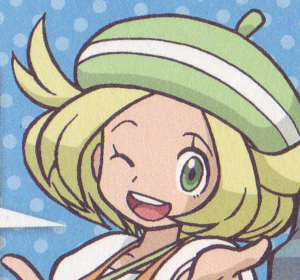
Bianca’s final show of strength comes in the form of her mad dash to inform the Gym Leaders of the impending danger at the Pokémon League. Without a Pokémon to use Fly, she can’t reach them all in time, but she doesn’t let that stop her. She bolts through the region and tells as many as she can to converge at the League that Team Plasma has overtaken.
She may not have a Pokémon team strong enough to fight alongside you, but without her help, you would have faced against six of the Seven Sages alone, and would not have made it to N in time to stop him. Cheren and Bianca may have drastically different motivations, but like dichotomous entities, there’s still some overlap—Bianca is able to help others when it’s necessary, to provide support and make a positive difference in peoples’ lives. By calling upon the Gym Leaders, she helped save the world in which people and Pokémon live together happily.
After you defeat N and Ghetsis, Bianca returns home. It’s clear she’s been telling her mother and father many stories about her journeys and what careers she may want to pursue, because both her parents make comments regarding the difficulty in making the singular choice that will propel you forward on your lifelong path. “Even if there are many things you want to do, you’re only one person. It’s frustrating, isn’t it?” her father says, more supportive and sympathetic than ever before.
It was Bianca’s, Cheren’s, and your mothers who asked Professor Juniper to deliver you three your starter Pokémon so you could all go off on an adventure. Even Cheren’s dad was supportive, stating, “Traveling is great! You encounter so many new things you’ve never seen and things you don’t yet understand. Wherever you go, you’ll learn something new and grow up a little.” Building on the original Red and Green’s underlying concept of a coming-of-age story, Black and White further emphasize the importance of independence in the process of “growing up,” with Bianca’s dad finally coming to the same conclusion, and Bianca herself finally getting to experience what life has to offer.
The color white is, scientifically speaking, created when all color wavelengths are reflected off an object. We’re all influenced by our experiences and the people around us—in Black and White, this represents Bianca more than anyone. Without any idea of where she wants to go in life, she is positively and heavily affected by all her influences. But Bianca cannot feasibly become a model and a bodyguard and a dedicated researcher. She must, as everyone does, make her own choice and filter out her influences. And it is precisely because she had her practical experiences that she is able to come to her own conclusion.
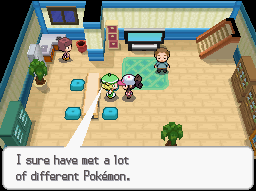 Once you defeat Alder, Bianca decides to look into Pokémon research. Juniper allows her to help out a bit, and as a result she grows highly informed about all sorts of Pokémon-related topics. She almost begins to sound a bit like Cheren, informing you of many different subjects, such as unique evolution methods and mass outbreaks.
Once you defeat Alder, Bianca decides to look into Pokémon research. Juniper allows her to help out a bit, and as a result she grows highly informed about all sorts of Pokémon-related topics. She almost begins to sound a bit like Cheren, informing you of many different subjects, such as unique evolution methods and mass outbreaks.
“I have to study lots of Pokémon research, but I don’t mind. This is the answer I found during my adventure! It’s actually a lot of fun!” One door—the door to becoming a strong Trainer—may have closed on Bianca long ago, but infinitely more opened as a result, and she has finally decided which one to step through.
White is easy to influence, “a blank slate with potential to become anything.”2 Different influences, different role models, paint the lives they touch with their myriad colors—different forces, some opposing and others allied, come together to create a beautiful picture. And the resulting person goes on to touch the lives of others, uniting us all.
A humble life of research or bodyguarding may seem insignificant compared to chosen heroes and Champions, but everyone has their own meaningful life to live, each just as brilliant as the next. And everyone has their own way to make the most of themselves, influenced by those other brilliant lives, whether they be Champions or a professor’s aide.
